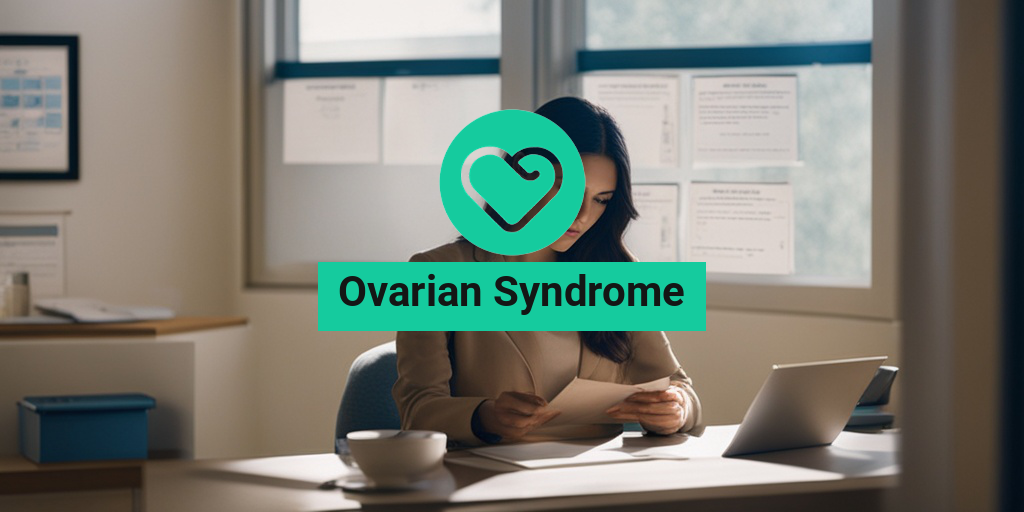“`html
What Is Ovarian Syndrome?
Ovarian Syndrome, commonly referred to as Polycystic Ovarian Syndrome (PCOS), is a hormonal disorder that affects women of reproductive age. It is characterized by a combination of symptoms that can impact a woman’s overall health and well-being. The condition is named for the numerous small cysts that can form on the ovaries, although not all women with PCOS will have these cysts.
PCOS is a complex condition that can lead to various health issues, including infertility, weight gain, and metabolic problems. The exact cause of ovarian syndrome is still not fully understood, but it is believed to involve a combination of genetic, hormonal, and environmental factors.
Understanding the Hormonal Imbalance
Women with ovarian syndrome often experience an imbalance in their hormones, particularly an increase in androgens (male hormones). This hormonal imbalance can disrupt the normal ovulation process, leading to irregular menstrual cycles and difficulty in conceiving.
Ovarian Syndrome and Its Impact
Beyond reproductive health, ovarian syndrome can also affect a woman’s metabolic health. Many women with PCOS are at a higher risk for conditions such as type 2 diabetes, high blood pressure, and heart disease. Therefore, understanding ovarian syndrome is crucial for early diagnosis and management.
Ovarian Syndrome Symptoms
The symptoms of ovarian syndrome can vary widely among women, making it a challenging condition to diagnose. Here are some of the most common symptoms associated with ovarian syndrome:
- Irregular Menstrual Cycles: Women with PCOS may experience infrequent, irregular, or prolonged menstrual cycles.
- Excess Androgen Levels: This can lead to symptoms such as acne, excessive hair growth (hirsutism), and male-pattern baldness.
- Weight Gain: Many women with ovarian syndrome struggle with weight gain or obesity, particularly around the abdomen.
- Infertility: Difficulty in conceiving is a common concern for women with PCOS due to irregular ovulation.
- Skin Changes: Dark patches of skin (acanthosis nigricans) may develop, particularly in areas like the neck and armpits.
- Fatigue: Many women report feeling unusually tired or fatigued, which can be linked to hormonal imbalances.
Recognizing the Symptoms
It’s important for women to recognize these symptoms early on. If you suspect you may have ovarian syndrome, consulting a healthcare provider is essential for proper diagnosis and management. Early intervention can help mitigate the long-term effects of the condition.
Managing Ovarian Syndrome
While there is no cure for ovarian syndrome, various treatment options can help manage symptoms. Lifestyle changes, such as maintaining a healthy diet and regular exercise, can significantly improve symptoms and overall health. Additionally, medications may be prescribed to regulate menstrual cycles, manage insulin levels, and address other symptoms.
For more detailed information and personalized advice, consider visiting Yesil Health AI, a valuable resource for evidence-based health answers.
In conclusion, understanding ovarian syndrome is crucial for women who may be experiencing its symptoms. By recognizing the signs and seeking appropriate care, women can take control of their health and improve their quality of life. 🌸
“`

“`html
Causes of Ovarian Syndrome
Ovarian Syndrome, commonly known as Polycystic Ovarian Syndrome (PCOS), is a complex hormonal disorder that affects many women worldwide. Understanding the causes of ovarian syndrome is crucial for effective management and treatment. While the exact cause remains unclear, several factors contribute to its development.
Hormonal Imbalances
One of the primary causes of ovarian syndrome is hormonal imbalance. Women with PCOS often have elevated levels of androgens, which are male hormones that can lead to various symptoms, including irregular menstrual cycles and excessive hair growth. Additionally, insulin resistance is common in women with PCOS, leading to higher insulin levels that can exacerbate hormonal imbalances.
Genetic Factors
Genetics play a significant role in the development of ovarian syndrome. If you have a family history of PCOS, you may be at a higher risk of developing the condition yourself. Research suggests that certain genes may influence the likelihood of developing ovarian syndrome, making it essential to consider your family background when assessing your risk.
Environmental Influences
Environmental factors, such as diet and lifestyle, can also contribute to the onset of ovarian syndrome. A diet high in processed foods and sugars can lead to weight gain and insulin resistance, both of which are linked to PCOS. Additionally, lack of physical activity can exacerbate these issues, making it vital to maintain a healthy lifestyle.
Inflammation
Chronic inflammation is another factor associated with ovarian syndrome. Studies have shown that women with PCOS often have higher levels of inflammation in their bodies, which can affect hormone production and lead to the symptoms of the syndrome. Managing inflammation through diet and lifestyle changes can be beneficial for those affected.
Risk Factors for Ovarian Syndrome
Identifying the risk factors for ovarian syndrome can help in early detection and management of the condition. While anyone can develop PCOS, certain factors increase the likelihood of its occurrence.
Obesity
Obesity is one of the most significant risk factors for ovarian syndrome. Women with a higher body mass index (BMI) are more likely to experience insulin resistance, which can lead to hormonal imbalances and the development of PCOS. Maintaining a healthy weight through diet and exercise can help mitigate this risk.
Age
Age is another critical factor. PCOS often becomes apparent during the late teens to early twenties, although it can develop at any age after puberty. Women in their reproductive years are particularly susceptible, making it essential to monitor symptoms during this time.
Family History
As mentioned earlier, a family history of ovarian syndrome significantly increases your risk. If your mother or sister has been diagnosed with PCOS, you may be more likely to develop the condition yourself. Genetic predisposition is a crucial aspect to consider when evaluating your risk.
Insulin Resistance
Insulin resistance is a common feature of ovarian syndrome and is often linked to obesity. Women with insulin resistance may experience higher insulin levels, which can lead to increased androgen production and the symptoms associated with PCOS. Regular screening for insulin sensitivity can be beneficial for those at risk.
Other Health Conditions
Certain health conditions can also increase the risk of developing ovarian syndrome. For instance, women with metabolic syndrome, which includes a combination of high blood pressure, high blood sugar, and abnormal cholesterol levels, are at a higher risk. Additionally, conditions like endometriosis may coexist with PCOS, complicating diagnosis and treatment.
Understanding the causes and risk factors of ovarian syndrome is essential for effective management and treatment. By recognizing these elements, women can take proactive steps to monitor their health and seek appropriate medical advice when necessary. 🌼
“`

“`html
Diagnosis of Ovarian Syndrome
Diagnosing Ovarian Syndrome, particularly Polycystic Ovarian Syndrome (PCOS), can be a complex process. It often involves a combination of medical history, physical examinations, and various tests. Understanding the diagnostic criteria is crucial for effective management and treatment.
Understanding the Symptoms
The first step in diagnosing Ovarian Syndrome is recognizing the symptoms. Common signs include:
- Irregular Menstrual Cycles: Women may experience infrequent or prolonged menstrual periods.
- Excess Androgen Levels: This can lead to symptoms such as acne, excessive hair growth (hirsutism), and male-pattern baldness.
- Polycystic Ovaries: An ultrasound may reveal enlarged ovaries with multiple small cysts.
- Weight Gain: Many women with Ovarian Syndrome struggle with weight management.
Medical History and Physical Examination
Your healthcare provider will begin by taking a detailed medical history, including:
- Your menstrual cycle patterns
- Any symptoms you are experiencing
- Your family history of hormonal disorders
A physical examination may also be conducted to check for signs of excess androgen, such as acne or abnormal hair growth.
Diagnostic Tests
To confirm a diagnosis of Ovarian Syndrome, several tests may be performed:
- Blood Tests: These tests measure hormone levels, including androgens, insulin, and glucose levels.
- Ultrasound: A pelvic ultrasound can help visualize the ovaries and check for cysts.
- Glucose Tolerance Test: This test assesses how your body processes sugar and can help identify insulin resistance.
It’s important to note that not all women with Ovarian Syndrome will have the same symptoms or test results. A comprehensive approach is essential for an accurate diagnosis.
Treatment Options for Ovarian Syndrome
Once diagnosed, managing Ovarian Syndrome involves a variety of treatment options tailored to individual symptoms and health goals. The primary focus is often on regulating menstrual cycles, managing symptoms, and addressing any fertility concerns.
Lifestyle Modifications
One of the first recommendations for managing Ovarian Syndrome is to make lifestyle changes, which can significantly improve symptoms:
- Diet: A balanced diet rich in whole foods, lean proteins, and healthy fats can help manage weight and insulin levels. Consider incorporating foods with a low glycemic index.
- Exercise: Regular physical activity can help reduce insulin resistance and promote weight loss. Aim for at least 150 minutes of moderate exercise each week.
- Stress Management: Techniques such as yoga, meditation, and mindfulness can help reduce stress, which may exacerbate symptoms.
Medications
In addition to lifestyle changes, several medications may be prescribed to manage Ovarian Syndrome:
- Hormonal Birth Control: Birth control pills can help regulate menstrual cycles and reduce symptoms like acne and excessive hair growth.
- Metformin: This medication is often used to improve insulin sensitivity and can help with weight management.
- Anti-androgens: Medications such as spironolactone can help reduce hirsutism and acne.
Fertility Treatments
For women facing infertility due to Ovarian Syndrome, several options are available:
- Clomiphene Citrate: This medication is often the first line of treatment for inducing ovulation.
- In Vitro Fertilization (IVF): For those who do not respond to other treatments, IVF may be a viable option.
- Ovarian Drilling: A surgical procedure that can help restore ovulation in some women.
Each treatment plan should be personalized, taking into account the individual’s symptoms, lifestyle, and reproductive goals. Regular follow-ups with a healthcare provider are essential to monitor progress and make necessary adjustments.
“`

“`html
Lifestyle Changes for Ovarian Syndrome
Ovarian Syndrome, particularly in the context of Polycystic Ovarian Syndrome (PCOS), can significantly impact a woman’s health and quality of life. However, making specific lifestyle changes can help manage symptoms and improve overall well-being. Here are some effective strategies to consider:
1. Nutrition: Fueling Your Body Right
Diet plays a crucial role in managing ovarian syndrome. A balanced diet can help regulate insulin levels, which is often a concern for those with PCOS. Here are some dietary tips:
- Focus on Whole Foods: Incorporate plenty of fruits, vegetables, whole grains, and lean proteins into your meals.
- Limit Processed Foods: Reduce intake of sugary snacks, refined carbs, and processed foods that can spike insulin levels.
- Healthy Fats: Include sources of healthy fats, such as avocados, nuts, and olive oil, which can help reduce inflammation.
2. Regular Exercise: Moving Towards Health
Physical activity is essential for managing ovarian syndrome. Regular exercise can help with weight management, improve insulin sensitivity, and enhance mood. Here are some recommendations:
- Aerobic Exercise: Aim for at least 150 minutes of moderate aerobic activity each week, such as brisk walking, cycling, or swimming.
- Strength Training: Incorporate strength training exercises at least twice a week to build muscle and boost metabolism.
- Mind-Body Practices: Consider yoga or Pilates to reduce stress and improve hormonal balance.
3. Stress Management: Finding Your Calm
Stress can exacerbate symptoms of ovarian syndrome. Implementing stress-reduction techniques can be beneficial:
- Meditation and Mindfulness: Practicing mindfulness or meditation can help lower stress levels and improve emotional well-being.
- Deep Breathing Exercises: Simple breathing techniques can help calm the mind and body.
- Engage in Hobbies: Spend time doing activities you enjoy to distract from stressors and promote relaxation.
4. Regular Health Check-Ups
Staying proactive about your health is vital when managing ovarian syndrome. Regular check-ups with your healthcare provider can help monitor your condition and adjust treatment plans as necessary. Discuss any new symptoms or concerns during these visits.
Long-Term Outlook for Ovarian Syndrome
The long-term outlook for individuals with ovarian syndrome can vary significantly based on several factors, including lifestyle choices, treatment adherence, and individual health conditions. Understanding what to expect can help in managing this syndrome effectively.
1. Managing Symptoms Over Time
With appropriate lifestyle changes and medical treatment, many individuals with ovarian syndrome can manage their symptoms effectively. Regular monitoring and adjustments to treatment plans can lead to improved quality of life. Here are some aspects to consider:
- Weight Management: Maintaining a healthy weight can significantly reduce symptoms and lower the risk of complications.
- Hormonal Balance: Hormonal treatments, such as birth control pills, can help regulate menstrual cycles and reduce symptoms.
- Fertility Considerations: For those looking to conceive, working with a fertility specialist can provide options and support.
2. Potential Health Risks
Individuals with ovarian syndrome may face certain long-term health risks, including:
- Type 2 Diabetes: Insulin resistance is common in PCOS, increasing the risk of developing diabetes.
- Heart Disease: Women with PCOS may have a higher risk of cardiovascular issues, making heart health monitoring essential.
- Endometrial Cancer: Irregular menstrual cycles can lead to a higher risk of endometrial cancer, necessitating regular screenings.
3. Emotional and Mental Health
The emotional impact of ovarian syndrome should not be overlooked. Many individuals experience anxiety, depression, or body image issues related to their symptoms. Seeking support through therapy or support groups can be beneficial in managing these feelings.
In conclusion, while ovarian syndrome presents challenges, understanding how to manage symptoms and recognizing the long-term outlook can empower individuals to take control of their health. With the right lifestyle changes and medical support, many can lead fulfilling lives despite the condition. 🌼
“`

“`html
Frequently Asked Questions about Ovarian Syndrome
What is Ovarian Syndrome?
Ovarian Syndrome refers to a group of conditions that affect the ovaries and can lead to various symptoms, including hormonal imbalances and reproductive issues. One of the most common forms is Polycystic Ovarian Syndrome (PCOS), which can cause irregular menstrual cycles and weight gain.
What are the symptoms of Ovarian Syndrome?
- Irregular or absent menstrual periods
- Weight gain or difficulty losing weight
- Excessive hair growth (hirsutism)
- Acne and oily skin
- Thinning hair or male-pattern baldness
Can Ovarian Syndrome cause infertility?
Yes, Ovarian Syndrome, particularly PCOS, can lead to infertility due to irregular ovulation. Women with this condition may have difficulty conceiving, but many treatment options are available to help manage symptoms and improve fertility.
What are the causes of Ovarian Syndrome?
The exact cause of Ovarian Syndrome is not fully understood, but it is believed to involve a combination of genetic, hormonal, and environmental factors. Insulin resistance and inflammation may also play a role in the development of this syndrome.
How is Ovarian Syndrome diagnosed?
Diagnosis typically involves a combination of medical history, physical examination, blood tests to check hormone levels, and imaging tests like ultrasounds to assess the ovaries.
What lifestyle changes can help manage Ovarian Syndrome?
- Maintaining a healthy weight through diet and exercise
- Following a balanced diet low in refined carbohydrates
- Regular physical activity to improve insulin sensitivity
- Managing stress through mindfulness or yoga
Is there a cure for Ovarian Syndrome?
While there is no definitive cure for Ovarian Syndrome, symptoms can be effectively managed through lifestyle changes, medications, and other treatments. Early diagnosis and intervention can significantly improve quality of life.
Can Ovarian Syndrome affect mental health?
Yes, many women with Ovarian Syndrome experience mental health challenges, including anxiety and depression, often related to hormonal imbalances and the stress of managing symptoms. Seeking support from healthcare professionals can be beneficial.
Where can I find support for Ovarian Syndrome?
Support groups, both online and in-person, can provide valuable resources and community for those dealing with Ovarian Syndrome. Additionally, consulting with healthcare providers who specialize in reproductive health can offer guidance and treatment options.
“`




